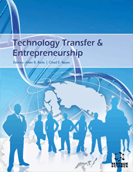Abstract
University technology transfer offices have greatly expanded their focus since the adoption of the Bayh-Dole Act in 1980. In addition to filing patents and licensing technology, technology transfer office activities now support translational research and related activities and the reach of these offices has expanded into nontraditional or non-STEM (Science, Technology, Engineering and Mathematics) areas of the university.
Seven university technology transfer officers gathered with intellectual property attorneys, private investment executives and technology innovation directors to discuss the latest trends in current technology transfer activities and responsibilities. The discussion focused on: 1) accelerating innovation and best practices, and 2) protection and/or enforcement of intellectual property rights.
Discussions revealed that technology transfer offices are becoming more involved in innovation centers to support startup formation, gap analysis, venture, private equity, corporate funding, business development, clinical trial arrangements and atypical industry partnerships. Focusing on customized solutions and employing creative thinking to support various innovative activities has helped technology transfer offices to succeed in supporting the mission of their respective universities.
Most universities file provisional patent applications to establish a priority date quickly and inexpensively. This strategy provides inventors with additional time to collect data and gives the technology transfer office time to discuss underlying technologies with prospective commercialization partners to better inform decisions to file a nonprovisional application. Technology transfer offices agreed that decisions to initiate litigation against potential infringers should be made on a case-by-case basis, citing costs and reputation as driving factors in the decision-making process.
Keywords: Academia, commercialization, innovation, intellectual property, Bayh-Dole act, entrepreneurial activity, gap funding, translational grants.
 28
28 4
4

